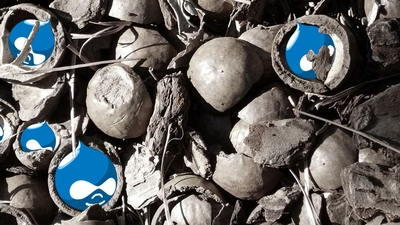What is a content management system?
Let's start with addressing the question, what is a content management system (CMS).
A content management system is the type of computer software used to manage the creation and modification of digital content or websites. An open-source CMS is software that is available for anyone to use and modify from its original design, free of charge. This means it can evolve, be tailored, and improved by developers all over the world. WordPress, Joomla, and Drupal are all well-known examples of open-source CMS platforms.
In comparison, closed proprietary source software is distributed under a licence agreement and the code is not shared with anybody. Essentially it is locked and only available to authorised users and even then, it will have modification, copying and republishing restrictions. Effectively it is not open to be changed by anyone. Examples of closed source website platforms are Adobe Experience Manager and SiteCore. Any software-as-a-Service (SaaS) CMS such as SharePoint, Wix and Squarespace should also be considered closed-source because you're not ultimately in control.
When choosing an open or closed source CMS the main objective for most businesses is to have a website that is easy to manage on a day-to-day basis. However, this needs to be balanced with security, flexibility, and cost. The trend towards the use of open-source solutions has grown exponentially over the years and below we explain the main reasons why we, at Pivale, recommend the use of open-source CMS.
Cost effective
Because open-source CMS platforms are distributed freely they can be altered and adapted by any developer. This means that companies choosing this option are not locked into the vendor, and their charges for updates and revisions.
The functionality of open source is as good, if not better, than closed commercial software. As commercial entities, software vendors of closed commercial software have a business model designed to make money. This will usually come from upgrades, new features, or enhanced security. But how will these upgrades benefit your customer? Will they increase sales, improve customer loyalty, or widen profit margins? If you choose not to upgrade, then it is possible that you will get left behind with inferior support and outdated file formats.
With open-source CMS there is less of a focus on regular upgrades and change tends to be more gradual. While open-source upgrades will advance as technology changes, there is usually a much smaller penalty for refusing or postponing an upgrade. It is also worth noting that although most developers do charge for extras like add-ons, integration, and additional services, with open source software this will usually be decided by your business timeframes and can be packaged together to keep costs down.
For example, if you wanted to add an events calendar or a 'contact us' page to your website, instead of developing solutions from scratch, there will very often be a plugin that is already available. While there may be some costs associated with setup and configuration of this plugin, and perhaps tweaking it to fit your brand, it will be considerably cheaper than designing and coding it from scratch.
As a result, websites built on open-source CMS software will usually offer better longer-term return on your investment.
Greater security
Some people may be concerned that an open-source CMS is less secure, however, it's actually quite the opposite if used properly. We accept it is a legitimate concern that anyone can access open source code, meaning developers with ill intentions can identify and exploit vulnerabilities in these systems. However online security is a key concern for everyone and because open-source code is open, it facilitates a constant process of peer review without proprietary restrictions. As a result, there is a worldwide open-source community of talented developers who are constantly reviewing and improving the code, closing gaps in security and regularly improving its quality.
This is why many well-known businesses are using open-source CMS platforms for their websites including Gov.uk, The White House, The London Stock Exchange, World Pay, NASA and TechCrunch to name just a few. Indeed, open source software is a mandated requirement for the websites of public sector and government organisations which is an indicator of the high level of security that can be achieved on a well built site.
When using an open-source CMS, it is important to choose a developer with a good reputation. They will ensure some of the basic security steps are taken such as using secure passwords and identifying and implementing system security updates. This will keep your system up to date with code that has been designed to protect sites from security threats and emerging issues. There are also a range of plugins your developer can use to further boost the security of your site. We recommend talking to your developer to discuss how best to keep your website and data safe.
Flexible and adaptable
Proprietary software usually requires users to accept terms and conditions of use and this restricts the ways in which developers and programmers can use it. However, with open-source, community members have open access to the source code and have the freedom to be able to use it in any way they see fit. This can mean new developments and functionalities are designed and implemented quickly, with little corporate decision making or organisational hierarchy to decide if it is a commercially viable proposition.
Freedom with the source code allows developers to create unique solutions, which can then be built upon by other members of the community. Effectively benefitting from the ideas and skills of the global community rather than restricting yourself to one software house.
Total ownership of business IP
Adopting open-source software over proprietary software is widely considered to be key to decentralising the web and taking local control of data. This reduces reliance on, and control from, big tech firms - many of which are based in the US and China.
Businesses that embrace open-source CMS benefit from greater control and transparency over their software, processes and crucially, their data. Owning your data, knowing where it is stored and understanding how it is used is increasingly important to businesses. Although closed-source proprietary software platforms explain how your data is used in their terms and conditions, do you always read all of the small print? And if you do, do you understand it? What if you don't agree with what it says?
GDPR puts responsibility for the security of your data firmly on your shoulders and so you need to be comfortable as to just how secure it really is.
With open-source CMS, companies are not tied to one web developer or agency, or to the proprietary software itself, because it is freely available in the marketplace and many developers will be comfortable with the software. This means that you have the freedom to easily change developers should the need arise.
In our experience, choosing the right developer and open-source CMS provides most businesses with the best chance of getting a website that will serve them well, today and in the future.




